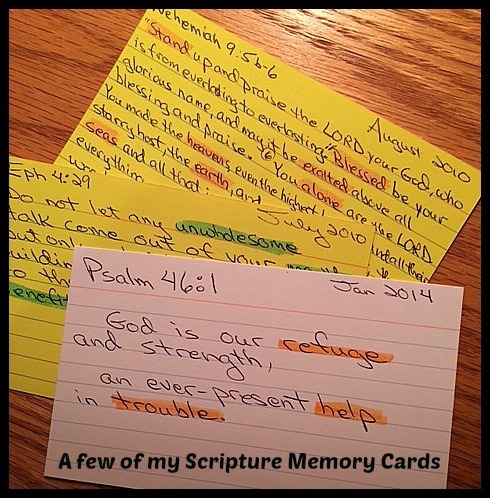Kathy Howard's Blog: Unshakeable Faith for Life, page 72
January 23, 2014
You are Insignificant
You and I are insignificant. Our impact on this earth is miniscule. Negligible.
We are but a breath. A blip in history. Even Scripture describes us as grass that quickly withers away (Isaiah 40:7).
It’s easy to forget just how insignificant we truly are because our personal universe is quite small. We’re a big fish in a small pond, as they say.
But, if you take a moment to contemplate the scope of God’s creation, your perspective will change. Recently, I did just that. My small group is reading “Crazy Love” by Francis Chan. In the book, Chan directs you to watch the following 3-minute video. I encourage you to watch it now.
Are you awed? If not, watch it again, because you missed something. We are insignificant. Lost in God’s great cosmos.
Now here’s the thing that should really blow our minds:
As insignificant as we are, God loves us and wants us.
Before He created the first star, He knew you (Ephesians 3:4-5). He does not need you, but He loves you and wants you (Acts 17:25, 27). He knows and cares about your every need (Matthew 6:28-33). You are so important to Him, that He gave His only Son over to death so you could be with Him forever (John 3:16).
In the midst of His vast, glorious cosmos, God sees you and calls you by name. And insignificant becomes significant.
How does it feel to be truly so small? How does it feel that God knows you and loves you?
January 20, 2014
The “First You Make a Roux” Method of Spiritual Mentoring
 Born and raised in the “tasty” state of Louisiana, I’ve been making gumbo, etouffee, and jambalaya for my family for years. Our daughters now make jambalaya, but none of them have made a dish on their own requiring a roux. Not until recently, that is.
Born and raised in the “tasty” state of Louisiana, I’ve been making gumbo, etouffee, and jambalaya for my family for years. Our daughters now make jambalaya, but none of them have made a dish on their own requiring a roux. Not until recently, that is.
Our youngest, Mark, is a junior at Louisiana Tech University. When he discovered he missed out on the Crawfish Etouffee I made for his dad’s birthday in early December, Mark asked if I would teach him how to make it over Christmas.
On Christmas Eve afternoon, we met in the kitchen and I pulled out my well-worn copy of Paul Prudhomme’s “Louisiana Kitchen” cookbook.
I turned to Mark and said dramatically, “First, you make a roux.”
Many, many Cajun dishes begin with a roux. It’s not only the beginning, it’s also the most important part. So that’s where we started. (If you’re interested, here’s some pretty good instructions for making a roux. One big difference between these instructions and the way I do it, is I heat the oil before adding the flour in slowly.)
5 Steps for Sharing Roux - or Your Faith – with Your Children
Mark did a great job with the etouffee. The entire family got to enjoy it for Christmas Eve dinner. This morning, when I was going through the photos I took, I realized that our etouffee lesson makes a great illustration for how we can purposefully work to pass on our faith to our children.
1. Model it – Just like we put Cajun dishes in front of our children all their growing up years, we also put our faith in front of our children. They saw us live the Christian life. They “tasted” the effects. In fact, they developed a taste for Jesus because He was constantly served in our house.
 2. Tell them – We moved out of Louisiana when our oldest was a baby, so Cajun food was not the culinary norm where we lived while they grew up. We had to make a point of not just cooking it for our family, but also telling them what it was and where it came from. Your kids will not get Jesus from our culture. It’s going to have to come from you. Tell them!
2. Tell them – We moved out of Louisiana when our oldest was a baby, so Cajun food was not the culinary norm where we lived while they grew up. We had to make a point of not just cooking it for our family, but also telling them what it was and where it came from. Your kids will not get Jesus from our culture. It’s going to have to come from you. Tell them!
3. Do it with them – When I taught Mark how to make etouffee, I didn’t have him stand to the side and watch me. And I didn’t give him a few instructions and leave the room. I handed him the skillet and the whisk and we did it together. Do faith with your kids. Go to church together. Have family devotions. Take them on a family mission trip. Talk about how you can obey God and serve Him while you sit around the dinner table.
 4. Encourage them to do it on their own – We gave Mark a copy of Paul Prudhomme’s cookbook for Christmas. I showed him how to do it and then I gave him what he needs to do it on his own. Let’s encourage our kids to make faith in Christ their own. Give them the tools and give them a small push!
4. Encourage them to do it on their own – We gave Mark a copy of Paul Prudhomme’s cookbook for Christmas. I showed him how to do it and then I gave him what he needs to do it on his own. Let’s encourage our kids to make faith in Christ their own. Give them the tools and give them a small push!
5. Celebrate growth – When we ate dinner on Christmas Eve, the whole family gushed about the delicious etouffee. Mark’s efforts were delicious and we let him know it! When you see your children take steps of obedience or grow in their faith, let them know you see it, that you’re proud of them.
 Hmm. Who would have known that Cajun cooking and spiritual mentoring have so much in common?!
Hmm. Who would have known that Cajun cooking and spiritual mentoring have so much in common?!
Have you ever used any of these suggestions to encourage your children in their faith? Do you have any “cooking” tips you could share with us?








January 16, 2014
Lost Connection in Real Life?
I witnessed something interesting and yet quite sad yesterday morning at the hospital. My husband and I sat in a surgical waiting room while Wayne’s dad received a pacemaker. We had been in the pre-op room with him until they actually wheeled him out to the operating room, but now we waited in the larger room with the family and friends of other patients.
 While we waited, a young couple arrived and checked in at the desk. The husband was scheduled for surgery. They were told to sit and someone would come for them. A short time later, a nurse appeared at the double doors and called the young man’s name.
While we waited, a young couple arrived and checked in at the desk. The husband was scheduled for surgery. They were told to sit and someone would come for them. A short time later, a nurse appeared at the double doors and called the young man’s name.
He stood up and walked toward the nurse. The wife sat. He stopped at the door, turned around, and looked her way with his hands raised at his sides, palms up. She never looked at him. Instead her eyes remained locked on the screen of her smart phone.
She could have gone in with him. She could have embraced him. She could have spoken words of comfort. But nothing.
After a few seconds the man turned and followed the nurse through the doors. His wife didn’t look up, but I clearly saw the hurt on his face.
For hours my thoughts kept returning to this scene. This young husband was headed into surgery and his wife didn’t acknowledge his departure in any way. What would cause her to behave this way, with total disregard for his needs?
My mind created numerous scenarios. Maybe they’d argued that morning or their marriage is struggling. Maybe he’s abusive or her heart is with someone else.
I guess it could have been any of these, but my gut tells me she was simply captivated by her email or Twitter. Her husband needed her attention, her compassion, her reassurance, but she was busy updating her Facebook status.
Don’t get me wrong here. I use and enjoy Facebook. And email is the primary way I send and receive information. But all of us need to remember these are merely tools to facilitate communication and relationship and not allow them to replace real relationships.
It’s sad to think this interaction – or rather, lack of interaction – is a sign of our times. Sometimes we are so absorbed with ourselves or our digital lives that we miss real moments and real relationships. Even when it’s important.
Okay, I admit, I possibly read way too much into this particular event. And she did go back to join him later on. However, this kind of distraction is not an unfamiliar sight.
Our culture perpetuates superficial connections. Social media gives us thousands of “friendships” with people we really don’t know and to be honest, mostly don’t care about. No wonder we’re producing self-focused people with few real relationships. Unfortunately, this mind-set also affects our relationship with God and His people.
What we fail to realize is that we need each other for so much more than dozens of likes and a few comments on our status update. God created us for community with Himself and other believers. We cannot be everything God wants us to be outside of a vital connection to His people (Ephesians 4:10-13).
I’ve been guilty of this. I’m challenging myself as much as you. I well know how easy it is to hide behind a screen. It’s neat and clean. My time is my own. I can cover most of my flaws.
But real life can get messy. And honest. And wonderful.
So, here’s my challenge for you and for me. Let’s commit to fostering and forging real community in real life. To love others and allow them to love us. To do life together without any screens in between.
How can you purposefully work to build relationships in real life? What can you do differently than you do now?
January 13, 2014
Where is Bangla…What? Why Should I Care?
I like living in America. Life is pretty easy and comfortable here. I’ve grown accustomed to conditions, which much of the rest of the world would consider “luxury.”
My heart and my mind have become lazy and insensitive. Millions around the globe live in poverty. In places where violence and empty bellies are the norm. In spiritual darkness where the name of Christ is ridiculed or simply not known.
But after all, what can one person do? The need seems overwhelming.
I don’t know of anything I can do, but I know Someone who can do everything.
Back in June, I was asked to go on a short-term mission trip to Bangladesh. After a few weeks of prayer and some really obvious direction from God, I committed to the trip.
But almost immediately I began having second thoughts. It’s not safe. It’s almost entirely Muslim. The conditions will be difficult. What in the world could I even do to help?
I’m going to be really honest with you. I think the biggest reason for my second thoughts is my dependence on my comfort. This materially abundant life has made me physically soft and spiritually calloused.
While these thoughts still plague me, I keep going back to the certainty that God told me to go to this place at this time. And I want to share just a bit with you.
 Bangladesh is one of the poorest and most densely populated countries in the world. About the size of Greece, it has 14 times the population. This Asian country sits on the Bay of Bengal, completely surrounded by India.
Bangladesh is one of the poorest and most densely populated countries in the world. About the size of Greece, it has 14 times the population. This Asian country sits on the Bay of Bengal, completely surrounded by India.
It’s a land of spiritual darkness. Bangladesh is 90% Muslim and 9% Hindu. Buddhists, Christians, and others make up the remaining 1%. In Bangladesh, about 400 women and children fall into the hands of human traffickers every.
Our team will be working with missionaries who operate centers for girls. They describe their ministry as “pre-trafficking” because in addition to telling them about Jesus, they work to educate them and teach them life skills that will help them provide for themselves. (If you’d like to see more about the need in Bangladesh and how you might could help, check out this page. The video below will help you understand the need.)
Every 160 million souls in Bangladesh desperately need Jesus. When Jesus stood on that mountain in Galilee 2,000 years ago, He saw these people. He knew their need when He told us to “Go and make disciples of all nations” (Matthew 28:19-20).
Jesus longs for all people to know Him. He wants all to find salvation in Him. So He sends someone to tell them.
And so we go. To our neighbors and coworkers. To inner city America and to the African bush. And to Bangladesh.
What keeps you from going?








January 6, 2014
7 Activities to Help You Memorize Scripture
We are almost a week into the new year. How are you doing with those New Year resolutions?
Perhaps you resolved to memorize Scripture in 2014, but now it feels like an insurmountable challenge. If you need some basic help getting started, check out these basic Scripture Memory Tips. If you need some direction about what to memorize, check out the various Scripture Memory Plans on my resources page.
 Once you have a list of Scriptures and know the basics, you can add use the following activities to enhance the memory process. Many of these activities assume you are using some kind of physical card system for your memory verses, such as index cards.
Once you have a list of Scriptures and know the basics, you can add use the following activities to enhance the memory process. Many of these activities assume you are using some kind of physical card system for your memory verses, such as index cards.
Reflect on Key Truths – Spend a few moments reflecting on what the verse teaches. This will help implant its truths in your heart and mind. For instance, consider the following: What you should believe about God. Things you can praise or thank God for. What you can pray for yourself or others.
Identify Anchor Words – Identify two to four key words or “anchor” words in the verse to help you remember it. For instance, in Psalm 46:1, three solid anchor words to remember could be “refuge,” “help,” and “trouble.” Circle these words on the front of the Scripture card and then write them on the back. Use these words as prompts during the memorization process.

Draw a Picture or Symbol – On the back of your Scripture card, draw a symbol or picture that visually represents the verse. For instance, for Psalm 46:1 you could draw a fort or castle. Along with your anchor words, this picture or symbol will be another prompt to remember the truths and content of the verse or passage.
Record It (great for auditory learners) – Use your smart phone, computer, or another device to record yourself reading or reciting the passage. Play it back throughout the day to further reinforce it in your memory.
Choose an Object (great for tactile learners) – Select an object around your home or office that will remind you of the verse or passage each time you see it. For instance, for Psalm 46:1, a rock or stone object would remind you that God is your refuge, a strong safe place.
Use Multiple Cards – Write the verse on more than just your primary card. Place these extra cards wherever you will seem them throughout the day and can take a moment to review – the bathroom mirror, above the kitchen sink, your car visor, your computer monitor, above the washer and dryer, the refrigerator door.
Reword it – Rewrite the verse in your own words. This will help you think about the meaning and how it should apply to your own life.
Let’s talk! Is there another activity that helped you in the past you’d like to share?
January 2, 2014
9 Tips for Spending Quality Time with God
The new year is a great time to renew our commitment to spiritual disciplines. Perhaps the busyness of the Christmas season drew us away from time with God. Perhaps we got so caught up in the problems and demands of life we drifted away without even realizing it.
 Whatever the reason, we can start again. God is waiting for us to turn our attention and our hearts back to Him. The following 8 tips will help us not only stick to our daily appointment with God, they will also help us really connect with Him.
Whatever the reason, we can start again. God is waiting for us to turn our attention and our hearts back to Him. The following 8 tips will help us not only stick to our daily appointment with God, they will also help us really connect with Him.
1. Establish a regular place and time – We are creatures of habit. If we know when and where we will meet with God daily we are much more likely to do it. Build it into your daily schedule. If this is new for you, start small, commit to it and God will grow it.
2. Organize your “tool” box – Gather your tools (Bible, reading plan, journal, pen, etc.) and keep them together in your designated spot so you’ll always be prepared. (I’ve found having a reading plan greatly increases the chance of me staying in the Word regularly. Without a plan, reading stays haphazard at best. I have several plans available on my “free resources” page.)
3. Start with prayer – Ask God to speak to you and help you understand His Word today. Thank Him for meeting with you.
4. Begin to read the Bible – Remember your purpose is to communicate with God. Expect God to speak to you through His Word. Don’t read hastily just to get through the passage. Let God stop you.
5. Meditate on the passage – Meditation is not emptying your mind. It is deep thinking on spiritual truths. As you read, linger over verses that impact you. Ask God questions and “listen” for His answers. Does this passage reveal something you should …
Believe about God?
Praise or thank or trust God for?
Pray about for yourself or others?
Make a decision about? Act on?
6. Pray as you read – Time with God should be interactive. Respond to God as He speaks to you through His Word.
7. Journal – Record what God says to you and how you will respond. Writing can help you stay focused on God and His voice.
8. Memorize – Commit to memorize verses God calls special attention to. Knowing Scripture by heart helps us guard against sin, reminds us of God’s promises, provides guidance, and allows us to meditate on God’s Word anywhere and anytime. (Here’s some tips for memorizing Scripture.)
9. Application – Apply to your life whatever God says to you through prayer and His Word. It may be repentance. It may be a change in behavior. It may be a specific action.
Let’s share! What do you find to be the hardest thing about spending regular time with God? What has helped you keep your commitment?








December 30, 2013
10 Characteristics of a Blameless Life
 This post was the most-viewed post of 2013! And it originally posted in September 2012!
This post was the most-viewed post of 2013! And it originally posted in September 2012!
Imagine entering heaven and approaching God’s throne. Picture yourself as you kneel at His feet and bask in the joy of His presence. All the struggles of life fade away as you praise Him who sits on the throne.
Do you long to enter God’s holy presence and joyfully worship at His feet? The woman whose “walk is blameless” (Psalm 15:2, NIV) may dwell in God’s sanctuary and live on His holy hill. I long to enter God’s presence, but I’m not sure I would describe myself as “blameless.”
According to Vine’s Expository Dictionary of Old and New Testament Words, the Hebrew word translated as “blameless” in Psalm 15:2 describes a person with “nothing in his outward activities or internal disposition that is odious to God.”
Good definition, but that’s too general for me to get my mind around. I need some specifics about what a “blameless” life looks like. Thankfully, the Bible tells us. Psalm 15 and 102 describe a “blameless” life (Read them now if you have time. They are not long.) The following list of characteristics is derived from these two psalms of David.
She practices praise – Regularly contemplate the holy nature of God. Recognizing His worthiness will not only foster praise, we will also be moved to obedience.
She lives with integrity at home – Sometimes we fail to purposefully watch our words and actions at home like we do other places. We tend to let our guard down; to allow our first, sinful instincts to rule. We need to be as careful at home as we are away from home.
She turns away from everything vile or vulgar – “Blameless” woman do not compromise with the sinful ways of the world. We don’t allow ourselves to become desensitized to immorality, crudeness, or risqué humor by watching it, reading it, or listening to it. For a sad example, read my recent post “Holiness is not a Shade of Grey.”
She ruthlessly guards against evil thoughts and behavior (vs 3b-4) – We must proactively rid our lives of every thought and action contrary to the nature and character of God.
She does not use her words to tear others down – Our speech should be edifying and encouraging. That doesn’t mean everything we need to say will be easy. But it does mean it will be helpful to the hearer.
She does not collaborate with ungodly, wicked people (vs 3-4) – The only way to never encounter ungodly people is to leave this life and transfer to heaven. However, we can choose not to enter into agreements, projects, or business dealings with people whose worldview is not Christ-centered.
She embraces honesty – Satan is the father of lies. Anytime we are less than honest we have yielded to the tempter! Let’s commit to total honesty in our own lives and conduct. We should also expect honesty from the people around us and distance ourselves from those who refuse to be honest.
She does not seek gain that brings harm to others – God wants us to use our God-given skills, talents, and gifts to support the Kingdom, serve others, and provide for ourselves and our families. However, any effort for gain or advancement that takes advantage of others is sinful.
She squashes pride and conceit – Pride fosters an abundance of sin. Those who want to live blameless before God will seek humility by keeping both God and ourselves in proper perspective.
She helps, encourages, and protects the godly – God calls us to serve others and meet the needs of those who cannot help themselves. Do we respond when they cross our paths?
This may not be a complete list of “blameless” characteristics, but it’s a start. Let’s keep searching God’s Word, applying what He shows us, and enjoying His holy presence!
Which of these 10 characteristics do you struggle with the most? Why is that, do you think?
December 26, 2013
5 Tips for Setting Spiritual Growth Goals for the New Year
This was the #2 post of 2013. All the principles still apply to 2014!
What do the following things have in common?
Exercise more
Lose weight
Improve my relationships
Pay off debt
Get organized
 Every year these items pop up in lists of the Top Ten New Year’s Resolutions. Do you plan on making resolutions for 2014? The first of the year is a great time to start fresh, set goals, and begin something new. In fact, it’s the perfect time to evaluate our spiritual health and set some goals for growth.
Every year these items pop up in lists of the Top Ten New Year’s Resolutions. Do you plan on making resolutions for 2014? The first of the year is a great time to start fresh, set goals, and begin something new. In fact, it’s the perfect time to evaluate our spiritual health and set some goals for growth.
We can’t cause our spiritual growth. Only the Holy Spirit has the power to transform us into the image of Christ (2 Cor 3:18). But God does expect our obedient and active cooperation (1 Cor 9:24-27). One way we can purposefully “train ourselves to be godly” (1 Tim 4:7-8) is through spiritual evaluation and goal-setting.
Resolutions and goals are often hard to keep. Statistics show that, at best, only 46% of New Year’s resolutions are still kept six months into the year. People lose their resolve quickly because they set unattainable goals.
The following five tips will help us set personal discipleship goals that will keep us growing through the year:
Concentrate your efforts. Set just one, two, or three goals at a time. Don’t spread yourself too thin. When you experience success then add another goal.
Be realistic. Set goals that are attainable. If you don’t read your Bible regularly now, don’t set a goal to read the entire Bible in three months. Instead commit to read it 3 to 5 times per week.
Think concretely. Set goals so progress can be measured. For instance, this goal is too ambiguous: I’m going to spend more time with God. Instead be concrete: I will read one Bible chapter and pray for 10 minutes five times a week.
Include strategies. Develop strategies designed to move you toward your goals. If one goal is to memorize Scripture, determine how you will do that. What verses you will memorize? How often you will tackle a new one? What memorization techniques you will use?
Create manageable steps. Break your overall goal into a series of smaller goals that are doable and will foster success.
How do we begin? First, take a serious look at your spiritual health. You may use the free “Discipleship Evaluation” download. This tool covers 17 different key discipleship areas. Your weakest areas can be great growth areas in 2014.
Next, set spiritual growth goals using the five tips above. Planning is not “unspiritual.” Living a life that glorifies God will not happen by accident. The free “Spiritual Goals” worksheet walks you through specific areas of discipleship such as time with God, ministry, service, and Christian education.
Most importantly, ask God to guide you as you evaluate your spiritual health and set goals for growth. He will bring the spiritual transformation as you strive to live a live that pleases Him.
What kind of spiritual growth goals have you had in the past? How did it go?








December 24, 2013
Only 3 Things Really Needed this Christmas
Do you ever feel as if you’ve lost control of Christmas? Has shopping, decorating, wrapping, cooking, and cleaning overwhelmed you? We can easily allow the busyness of the season to push the reason we celebrate to the background.
A few weeks ago, in preparation to speak at a women’s event on a “less stress Christmas,” I went back to the account of that first one. Those chapters in Matthew and Luke are so familiar I can practically recite them. But this time through God showed me something in a new way.
God directed my attention to the way Mary, the shepherds, and the Magi responded to the birth of Jesus. Three responses to the coming of our Savior that transcend time and culture. Three responses that should be the focus of our Christmas celebrations today.
1. Share Jesus (Like the Shepherds in Luke 2:8-18) – the shepherds “spread the word” about all they had seen and heard. They told others about the birth of the long-awaited Messiah. What about us? Do we share Jesus at Christmas? Here are a few ways we can share the Savior with friends and family.
Invite them to church and other Christmas events.
Make the most of every opportunity – Christmas cards (if you send them!), parties, gifts, family gatherings.
Tell people what God has done in your life.
2. Worship Jesus (Like the Magi in Matthew 2:10-12) – The kings from the orient traveled a long way to joyfully worship the baby King. We can purposefully build times of worship into our Christmas activities and celebrations. Here’s a few ways.
Attend a Christmas Eve service
Read the biblical story of Christmas with your family.
Sing faith-based Christmas songs when you go caroling.
3. Ponder Jesus (Like Mary in Luke 2:18-20) “Ponder” means “to throw together; to put one thing together with another in considering circumstances.” Mary collected everything she had seen and heard together in her mind, thought about them deeply, and held onto them – the angel’s visit, the shepherds, the magi, and more. We can also “ponder” Jesus at Christmas. For instance, we can spend time contemplating why He came.
To provide our ransom (Matthew 20:28).
To give us abundant life (John 10:10)
To die on a cross for our eternal salvation (Philippians 2:8)
I challenge you to do things a little differently this Christmas. Cut back on some of the more time-consuming activities and instead focus on the three things that happened that first Christmas. Share Jesus. Worship Jesus. Ponder Jesus.
What will you cut back on? What will you refocus on this year?
December 23, 2013
Question Raised by Duck Controversy: Grace or Truth?
I’ve been doing a lot of thinking since the Duck Dynasty controversy heated up last week over Phil Robertson’s comments in a GQ article. (Albert Mohler’s post gives a good summary of the controversy in case you’re one of the three people who haven’t heard.) Many Christian bloggers and posters defended Robertson. They applauded his bold stand for God’s truth and tossed their support his way.
 Although I’m a Duck Dynasty fan, I wasn’t going to blog about it. I didn’t feel a need because there was so much being said already. That was before I read Jen Hatmaker’s post.
Although I’m a Duck Dynasty fan, I wasn’t going to blog about it. I didn’t feel a need because there was so much being said already. That was before I read Jen Hatmaker’s post.
It’s beautiful and thought provoking. She writes about the need for Christians to extend Jesus’ love and grace to a lost and suffering world, how public words of condemnation only cause hurt, and that conversations within the context of relationship are best. And I wholeheartedly agree. Christians must lovingly share the grace of God, which He so lavishly poured out on us.
Hatmaker proposes that Christians must extend love and grace. And her comment section shows that many agree with her. This past week, many Christian bloggers also wrote that we must extend God’s truth.
So which is it? Grace or truth? Yes!
It’s not grace or truth. It’s grace and truth. As Christians, we cannot leave either by the wayside. Jesus, “who came from the Father, full of grace and truth” (John 1:14), is our example.
The Effects of Sin and The Need for Truth
Yes, the suffering world desperately needs the love and grace of Jesus. But it’s sin that has caused the suffering in the world. Our culture is saturated with its devastating consequences.
Sin is a cancer eating away at the fabric of our society. We see its effects everywhere. Our prisons overflow. The family is disintegrating. Sex fuels the popular culture. This cancer needs a cure before it’s too late for the patient. We need God’s grace and His truth.
In her post, Hatmaker wrote she chooses to “preach the scandalous love of Jesus in the face of any issue, demographic, or debate.” Yet, how can we share the love of Christ without sharing His greatest act of love.
“But God demonstrated His own love for us in this: While we were still sinners, Christ died for us” (Romans 5:8). The Gospel isn’t the Gospel without the “Jesus died for our sins” part (1 Corinthians 15:3).
Jesus died for our sins. He died because we are sinners. Without the acknowledgment of sin, there will be no recognition of a need for a Savior. And there will be no salvation. No spiritual healing.
Gracious Truth
The world needs both grace and truth, but they also won’t respond to a dogmatic diatribe of right and wrong. While we must not hesitate to share God’s truth, our conversation must always be “full of grace” (Colossians 4:6), presented with “gentleness and respect” (1 Peter 3:15). Let’s focus on the grace and mercy of Jesus and the forgiveness of sin He offers. And let’s be bold but gracious when God’s truth must be applied to specific topics.
Robertson obviously responded to direct questions about specific issues. While I agree that Robertson spoke words of truth, they could have been more gracious and gentle. Even the Robertson family alluded to that in their official statement.
 Of course, there will be times – no matter how graciously we present God’s truth – that the hearers will respond with anger and hate. The message of the Cross is foolishness to the world (1 Corinthians 1:18). For some, it is a sweet aroma of life, but to others it is the smell of death (2 Corinthians 2:14-16). But that should not keep us from sharing the Good News. And we should not water it down to make it more palatable. (Jim Daly’s post at Focus on the Family elaborates on the offense of the Gospel.)
Of course, there will be times – no matter how graciously we present God’s truth – that the hearers will respond with anger and hate. The message of the Cross is foolishness to the world (1 Corinthians 1:18). For some, it is a sweet aroma of life, but to others it is the smell of death (2 Corinthians 2:14-16). But that should not keep us from sharing the Good News. And we should not water it down to make it more palatable. (Jim Daly’s post at Focus on the Family elaborates on the offense of the Gospel.)
Come as you are!
The Gospel is good news because Jesus will receive any and every sinner! There is no sin too great, no background too sordid, no heart too rebellious. Jesus’ sacrificial death covers it all. The cross is able to heal all wounds.
Yet on the redeemed side of the cross, He calls us to live holy lives. Just as He lifted the woman caught in adultery and said, “Go and sin no more,” He raises us up in new lives and tells us to “live a life worthy of the calling we have received” (Ephesians 4:1).
Yes, Jesus invites us to come to Him just as we are. But, He doesn’t want us to stay just as we are.
God calls the prideful to humility.
God calls the selfish to give.
God calls the gossip to speak only word that build up and encourage.
And calls the sexually immoral to purity.
In other words, God calls believers to holiness (Ephesians 4:24). We cannot sweep continued, unrepentant sin under a “rug of grace.” Jesus died for our sins because they were heinous enough to separate us from God. Our sins cost Jesus His life. How can we simply continue to live in them? But that’s what we do when we ignore the truth about what God calls sin.
Yes, Jesus is loving, but He is also just. Jesus is merciful, but He is also holy. We must not misrepresent Jesus to either the world or the Church.
It’s not grace or truth. It’s grace and truth. Both/and. Amen and amen.




